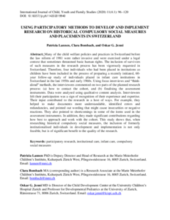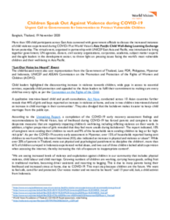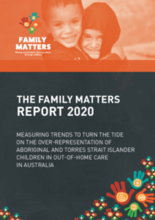Demographic Data
|
Sources: World Bank, UNDP, UNAIDS, DHS 2013 |
Displaying 3261 - 3270 of 14390
El propósito de este contrato es profundizar sobre el análisis de la situación de las modalidades de cuidados ofrecidos por los Estados en América Latina y el Caribe con un enfoque en la comunidad y la familia, con un especial énfasis en la atención a la niñez en contextos de movilidad humana y en otros contextos altamente vulnerables, con especial atención a las niñas y adolescentes mujeres.
This study shows that, when researching historical compulsory social measures, the inclusion of formerly institutionalised individuals in development and implementation is not only feasible, but is of significant benefit to the quality of the research.
This presentation - delivered by Marinus van IJzendoorn at a 18 November 2020 meeting of the Evidence for Impact Working Group, a working group of the recently launched Transforming Children's Care Global Collaborative Platform - presents evidence of the harmful impacts of institutionalization on children, demonstrates some of the benefits of deinstitutionalization for getting children back on track, and raises questions about gap-year volunteers working in orphanages.
This webinar was part of Eurochild's breakfast webinars to mark World Children’s Day 2020. Focusing on the economic arguments for investing in children, this webinar also highlighted Finland’s efforts to prioritise children’s rights and why this makes economic sense.
Following thousands of comments and responses posted by the 8,000 course participants for the MOOC on COVID-19: Adapting Child Protection Case Management, as well as research and evidence being issued by child protection agencies, three international experts were invited to provide short videos containing advice and opinions of experts in different regions of the world regarding the need to plan for support for children for the evolving situation of COVID-19 and in particular post-pandemic scenario.
More than 100 child participants across East Asia convened with government officials to discuss the increased instances of child violence experienced during COVID-19 at World Vision’s Asia Pacific Child Well-Being Learning Exchange forum on 18 November 2020.
The authors of this study conducted a large-scale cross-sectional population study of Hong Kong families with children aged 2–12 years. Parents completed an online survey on family demographics, child psychosocial wellbeing, functioning and lifestyle habits, parent–child interactions, and parental stress during school closures due to COVID-19.
The stories of children formerly in care in Canada, are being published in a new book called Youth in Care Chronicles, according to this article from CBC News.
This report reflects on the effects of the coronavirus pandemic on children. It compiles information gathered from 25 countries across Europe, and provides recommendations for improving public policies in the short and long-term to support better outcomes for children and families, including children in alternative care or at risk of separation.
Family Matters reports focus on what governments are doing to turn the tide on over-representation of Aboriginal and Torres Strait Islander children in out-of-home care and the outcomes for children. They also highlight Aboriginal and Torres Strait Islander-led solutions and call on governments to support and invest in the strengths of Aboriginal and Torres Strait Islander peoples to lead on child wellbeing, development and safety responses for our children.




